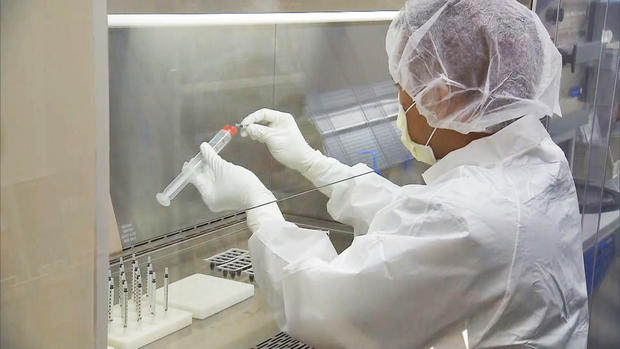Husband awaits meningitis test results following wife's death
A Michigan man awaits the results of a meningitis test to see if he has contracted the same infection that has been tied to contaminated steroid injections that killed his wife.
A memorial service will be held for 67-year-old Lilian Cary on Tuesday Oct. 9, CBS Detroit reported. She had been treated at Michigan Pain Specialists in Brighton with a steroid injection for her chronic back pain.
She had been ill since late August, according to the Associated Press, but meningitis wasn't detected until Sept. 22. However her health seemed to be improving at University of Michigan hospital.
- Ninth person reported killed in meningitis outbreak
- Finding meningitis victims before it's too late
- Doctor calls for more regulation amid deadly meningitis outbreak
"She was responding to medication. Her spirits were up. Her fever was broken. She was walking the hallway and Skyping with grandsons," George Cary told the AP. She became unresponsive on Sept. 26 and was taken off life support four days later, after suffering a stroke.
Her husband George told CBS Detroit he's left "watching the clock" until he gets news on his own tests, since he got similar injections at the same clinic.
In Michigan, 21 people have contracted meningitis including two deaths, according to recent CDC data. The other person who died was a 56-year-old woman.
"We are working with those facilities to reach our the patients that may have received an epidural injection between July and the beginning of October and who may be experiencing particular symptoms," a spokesperson for the Michigan Department of Community Health, told the station.
Already 105 people have been infected with meningitis in nine states, including eight deaths. A ninth death was reported late Monday by a Nashville, Tennessee, hospital. Health officials said Monday as many as 13,000 people received the steroid shots in question.
States with confirmed cases include Florida (four cases), Indiana (11 cases), Maryland (five cases including one death), Michigan (21 cases including two deaths), Minnesota (three cases), North Carolina (two cases), Ohio (one case), Tennessee (35 cases including four deaths) and Virginia (23 cases including one death).
The outbreak is tied to methylprednisolone acetate steroid injections made by specialty pharmacy the New England Compounding Center. Once contaminants were discovered in an unopened vial during an inspection at the Framingham, Mass. Facility, three lots of single-dose vials of the steroid that were sent to 76 facilities in 23 U.S. states -- 17,676 vials -- were recalled
The company, which mixes medications and is not subject to the same FDA approval as a pharmaceutical company that manufactures drugs, expanded its recall Saturday to include all other products the company manufactures. The company is licensed in all 50 states.
"The FDA had previously issued guidance for medical professionals that all products distributed by NECC should be retained and secured," the company said in announcing the expanded recall Saturday. "While there is no indication at this time of any contamination in other NECC products, this recall is being taken as a precautionary measure."
Fungal meningitis is not contagious like the more common bacterial and viral forms. The disease can be treated with high-dose antifungal medications, and health officials said the earlier people get treated, the likelihood for better outcomes increases.
The source of the fungus has not yet been identified, and the cause of infections in the other patients is still being assessed, the CDC said.
Infected patients have reported mild symptoms, including slight weakness, slightly worsened back pain or even a mild headache, according to the CDC. Patients have had symptoms generally starting from one to four weeks after receiving the injection. Those who had an epidural steroid injection since May 21, 2012, should talk to their doctor as soon as possible if they are experiencing the previously mentioned symptoms in addition to fever, sensitivity to light, stiff neck, slurred speech or increased pain and redness at the injection site. Concerned patients could also check with their doctor if they have any questions on the type of medication used in their procedure.
Dr. William Schaffner, who has been tracking the outbreak at the Vanderbilt University Hospital, told the CBS Evening News that the majority of people who received the injections will not get sick.
"If there is a silver lining, it's that apparently many people were inoculated but the attack rate is very small," he said. "It's really about 1 percent or less. We hope that that continues."
The CDC has more information for patients on the multistate meningitis outbreak.

